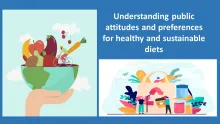A multi-million pound programme of strategic research delivered over five years providing science and evidence to support policymakers and its partners. Informed by strong partnerships and the needs of a broad range of stakeholders. Science at the heart of society contributing to the health, wealth and wellbeing of Scotland and beyond.
Ongoing research (2022-2027)
Tools to support healthier, safer, Scottish food produce
This project seeks to provide tools to rapidly identify chemical risks in foods and to contribute to improved consumer diets through reformulation to reduce harmful components such as sugars, fats, and salt.
Tools to support provenance of Scottish food produce
We are measuring the Strontium (Sr) isotopes in Scottish soils to create a map (isoscape) to aid in determining the origins of conventionally grown crops. For crops grown in soilless, controlled environment units the link to location is however lost. We are therefore analysing the crops, waters and nutrients from such producers using isotope and chemical methods to see whether such an approach could be used for provenancing.
Towards Carbon Positive Through Improved farming
Agriculture has a key role in sequestering carbon and mitigating greenhouse gas emissions to meet net zero targets. A lack of cost effective, robust, consistent, transparent and accurate methods limits large-scale use of mitigation measures. This project aims are to improve assessments of mitigation practices for additionality, permanence, and uncertainty in achieving net zero, and produce regionally specific options to reduce GHGs and effective monitoring mechanisms.
Understanding how fibre reduces food intake and adiposity
Dietary fibre has several health benefits; amongst these is acting as a restraint on food intake, body weight gain and adiposity. This study examines the gut response to high dietary fibre (pectin, oligofructose or mixed fibre) in mice fed a high fat diet to understand the mechanisms involved. The purpose of the study is to investigate how type of fibre and dose may alter this response, with the aim of providing new insights and improving our understanding of the public health benefits, so that we can advise policy, the food drink industry and the public on which type of fibres reduce food intake and how they work.
Understanding of the principal drivers of pest and disease incidence, severity, and spread in Scotland, and the factors currently limiting effective disease control
We are delivering a comprehensive body of research that integrates cutting-edge mapping, artificial intelligence, genomics, experimental, and modelling techniques to quantify the abundance, diversity, and spatiotemporal dynamics of key Scottish crop pests and pathogens, as well as the ecology of pest and pathogen-host-environment-management interactions and potential impacts of climate change.
Understanding public attitudes and preferences for healthy and sustainable diets
This project aims to understand how to influence consumers to make long-term changes in dietary behaviours, more specifically, assess UK and international approaches to driving long-term changes in dietary behaviour at population level and understand facilitators and barriers for consumers to make healthier and more sustainable food choices, with a focus on reducing health inequalities.

Understanding the diversity of Shiga toxin-producing E. coli and its relationship with human pathogenic potential
Per head of population, more cases of human illness from infection with Shiga toxin producing E. coli (STECs) occur in Scotland than elsewhere in the United Kingdom. We use detailed information from whole-genome sequences to improve knowledge of STEC that exist in the ecosystems of Scottish dairy cattle, sheep, farmed deer and leafy produce. We compare them with sequenced isolates from Scottish human cases, to help develop ways to reduce the burden of disease in the Scottish human population. We also investigate if current laboratory diagnostic detection methods can be improved, which would save time and money.
Understanding the dynamics antimicrobial resistance genes flux in the soil, animals and humans in different fertilisation practices in grasslands
This project generates new insights on how the antimicrobial resitance bacteria and genes flow between farm and environment and the risk of different farms practices in the spreading of antimicrobial resistance to humans via the food chain. We analyse antibiotic and heavy metal residues for its role in antimicrobial resistance selection in soil samples. The data is informing the development of a risk model to help assess the impact of different farm management approaches.
Understanding the mismatch between domestic consumption and production in Scotland
This project is generating a new practical understanding of how current Scottish food production matches or differs compared to consumption patterns of Scottish households. We are using the information about the mismatch between local supply and demand to identify opportunities for increased food security and generating insights between what is produced and what should be consumed based on recommendations. We are also identifying how climate change may affect the local food supply and discuss how to deliver increased resilience.
Understanding the Scottish food supply chain
We are consolidating data to map production, imports and exports of fresh and processed foods for major Scottish agri-food supply chains, and map these against purchasing and intake data, as well as dietary recommendations. We also model the impacts and requirements of a transition to more healthy and sustainable scenarios of production and consumption in Scotland.